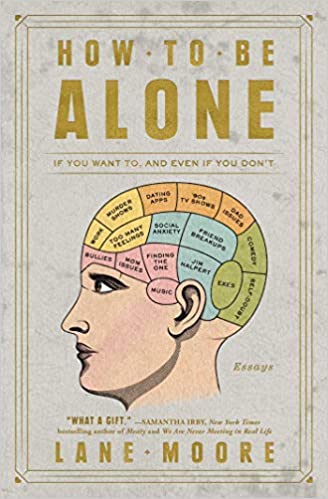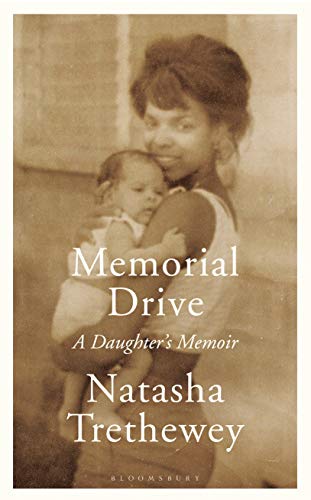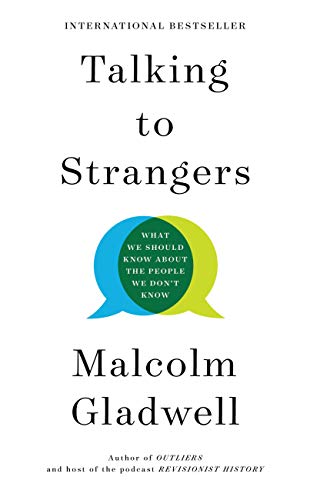How to Be Alone: If You Want To, and Even If You Don’t. Lane Moore. 2018. Atria Books. 224 pages. [Source: Public library.] Random scrolling in the Libby app led me to How to Be Alone, written by comedian, writer, and musician Lane Moore. I wasn’t quite sure what to expect, but the title caught my attention considering I enjoy my fair share of alone time. How to Be Alone, however, is less about the beauty found in solitude, and more about how the author coped with the physical and psychological isolation she has navigated since her childhood. In this memoir, Moore shares vignettes of her life that center her connections with other people — or lack thereof. From friendships, to relationships, and her career, she bares a lot in the name of transparency, and it reads a lot like a cautionary tale. The “how-to” aspect of the book was not prominent until the final chapter. The rest, however, did read like a “what not to do,” though I’m not sure that’s what the author intended. Moore isn’t specific in the book about the nature of what she experienced with her family, but she is clear about its impact on…
Memorial Drive. Natasha Tretheway. 2020. Bloomsbury Publishing. 229 pages. [Source: public library.] Mother-daughter relationships are so often fraught. Mothers are often entrusted with raising healthy, whole adults and it seems daughters will find themselves raging against the strain of expectation and vicarious dreams. If they’re lucky, time will give them opportunity to reconcile the tension and benefit from an understanding of each other that comes with age. Unfortunately, that’s not the story of Memorial Drive, Natasha Trethewey’s memoir. Instead, Memorial Drive starts off with the hard truth that Natasha and her mother Gwendolyn did not have the benefit of time bringing them closer with a renewed relationship. It starts where it ends, with Gwendolyn’s murder at the hands of her ex-husband when Natasha was a 19-year-old freshman in college. The rest of the book follows as Trethewey, more than 30 years on, reflects on her childhood and adolescence, framed largely around the relationship between her and her mother. She recounts her earliest years with her black American mother and white Canadian father in the relative cocoon of familiarity in Mississippi. Later, when her parents separate, she ends up in Georgia, where the majority of her trauma unfolds during a period…
Talking to Strangers. Malcolm Gladwell. 2019. Little, Brown and Company. 401 pages. [Source: Public library.] I picked up Talking to Strangers with little in the way of expectations. I had a long drive, and wanted to listen to something I could concentrate on enough to stay awake. I got so much more than that with this book. Talking to Strangers asks two central questions — why don’t we know when people are lying to us and why don’t we believe people are telling the truth? The big picture example for this book is the traffic stop of Sandra Bland in 2015. Gladwell asks what went wrong in this encounter, and then uses a host of case studies to illustrate how people make sense of the words, actions, and intentions of strangers, often highlighting the missteps and misinterpretations thad led to disastrous outcomes. The book is both informative and entertaining in presenting various communication and behavioral theories. Gladwell shows skill in presenting both well and lesser-known situations with nuance that feels more like a conversation and less like sitting in a lecture hall. He presented the case studies with an appropriate level of succinctness while being sure to cover information that…
God-Level Knowledge Darts. Desus Nice & The Kid Mero. 2020. Random House. 210 pages. [Source: Personal copy & public library.] Anyone who is remotely familiar with the unique brand of comedy offered up by Desus and Mero won’t be shocked or disappointed by the knowledge darts they drop in their literary debut. The same irreverence they deliver on their podcast and late night show is presented in God-Level Knowledge Darts, complete with the back and forth that is their signature. The topics on which they offer advice range from parenthood, relationships, recreational drug use, personal finances, and even toxic masculinity. While some of the advice teeters on the edge of legality and good sense, they do drop some insightful and useful lessons that are rooted in experience (they did that so hopefully you won’t have to go through that). If you need to spice up a boring relationship, they’ve got you. Not sure if the the possibility of NFL stardom outweighs the risk of CTE? It’s in here. Trying to figure out how to how to finesse when the rent is late? That’s here, too. And if you find yourself unable to avoid the bookings, beloved? They have some best…
One Night. Eric Jerome Dickey. 2015. 370 pages. Dutton. [Source: public library.] I consider myself an Eric Jerome Dickey fan that’s fallen off the wagon. I began reading his novels in my early 20s, and after I read Chasing Destiny, Genevieve, and Pleasure, he could do no wrong in my eyes. I’ve since expanded what I read, so it’s been a few years since I checked for him. I was surfing my public library’s audiobooks when I came across One Night and was completely intrigued by the description. Two strangers, one night, murder, lies, etc? I was sucked in immediately. Unfortunately, the book failed to live up to my lofty expectations of EJD. One Night is a few hours short of a day in the life of former actress Jackie and The Man from Orange County. Seriously, that’s how he is referred to throughout the book. The book chronicles their introduction and parting in painstaking detail, giving minute-by-minute accounts. It starts with Jackie trying to scam the wealthy, attractive man at the gas station into purchasing a iPad. It ends with a body in the trunk of a luxury car with sirens approaching.





